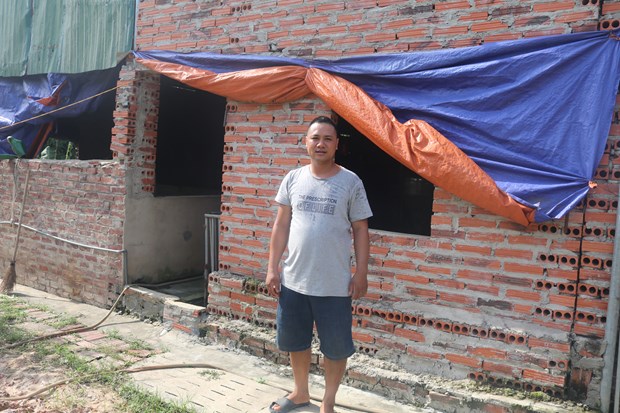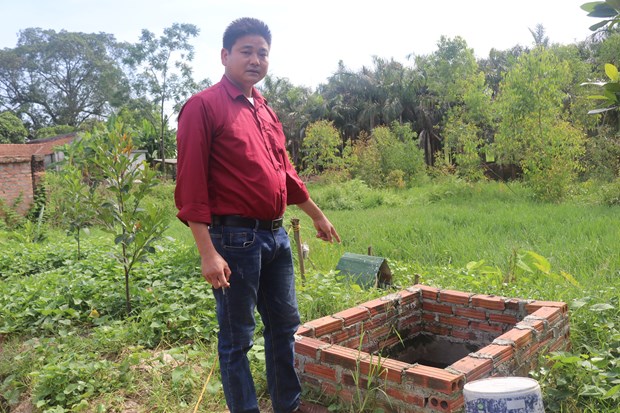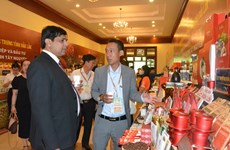Netherlands-funded biogas project effective in rural areas
Biogas digesters have provided a valuable source of environmentally friendly energy for cooking and other uses of those living in rural areas in Vietnam.
 Nguyen Quoc Trang, 35, in the Hanoi’s Soc Son district is among those who have seen a lot of advantages from using biogas digesters (Photo: VNA)
Nguyen Quoc Trang, 35, in the Hanoi’s Soc Son district is among those who have seen a lot of advantages from using biogas digesters (Photo: VNA)Hanoi (VNA) – Biogas digesters have provided a valuable source of environmentally friendly energy for cooking and other uses of those living in rural areas in Vietnam.
A biogas project launched by the Dutch Aid Agency (SNV) in 2003 has benefitted hundreds of thousands of rural residents across Vietnam, changing their mindsets towards a greener lifestyle with lower pollution.
Nguyen Quoc Trang, 35, in the Hanoi’s Soc Son district is among those who have seen a lot of advantages from using biogas digesters.
“The biogas digester has helped me save a lot of time, money and labour in farming pigs”, said the pig farmer, who has used a composite digester for five years.
The SNV-funded biogas project guided biogas digester users to convert waste, particularly waste discharged by animal farming, to clean and reliable energy for cooking and heating via fermentation. The process helps reduce health and environmental problems for the users and their neighbours.
“Before having the digester, our pig farm smelled a lot. My wife and I had to collect and clean the waste twice a day. It was very hard work,” Trang said.
Trang spent 11 million VND (500 USD) for a composite digester installed in his garden in 2013.
He said the workload at his 30-pig farm decreased and his fuel bill also decreased.
Nghiem Van Tam, who provided the service for Trang, said he has installed biogas digesters of different sizes for many pig farmers in the neighbourhood. Tam’s business has been spreading to other localities nationwide after 10 years.
 Nghiem Van Tam, who provided the service for Trang, said he has installed biogas digesters of different sizes for many pig farmers in the neighbourhood (Photo: VNA)
Nghiem Van Tam, who provided the service for Trang, said he has installed biogas digesters of different sizes for many pig farmers in the neighbourhood (Photo: VNA)He is one of the masons receiving technology transfer, training and consultation under the SNV’s biogas project.
Tam also received 1.2 million VND (50 USD) for each digester he installed for customers.
“The project helps masons like me have a stable job with good income,” said Liem.
“It also works to ensure Vietnamese rural people have sustainable pig farming.”
According to Nguyen Thu Ha, SNV adviser on Renewable Energy, the biogas project, now in the third phase (2017 – 2020), applies the results-based Financing Facility (RBF) mechanism.
In 2014, the project started to pilot incentives, set at 1.2 million VND (50 USD), for biogas entrepreneurs based on the number of bio-digesters they have sold, Ha said.
The RBF incentives were designed to improve the quality of installed digesters, while ensuring end-user training and construction of digesters meet set standards in the field, and increasing the number of biogas digester users.
However, incentives will be reduced in 2018, and will no longer be offered in 2019, Ha added.
More than 162,500 domestic biogas digesters have been constructed across 55 provinces and cities in the country so far.
The figure is expected to reach 180,000 by 2018.
The project will contribute to reducing greenhouse emissions (GHG) by approximately 589,125 tonnes of CO2 annually, by replacing the use of fossil fuels and non-renewable biomass, and by stopping animal waste releasing methane gas into the environment.
The biogas project will bring sustainable energy and livelihoods to more than 840,000 people, while providing bio-slurry which can be used by farmers to improve soil fertility.
In Vietnam, animal husbandry is a vital sector in the national and rural economy.
The population of pigs raised in the country increased by about 35 percent between 2000 and 2010, from about 20 million to more than 27 million heads.
The National Livestock strategy to 2020, forecasts the pig population to reach 35 million heads.-VNA













